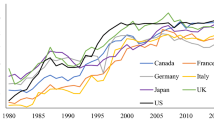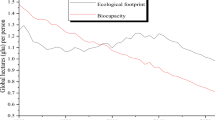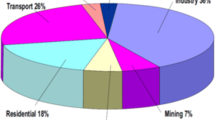Abstract
This study focuses to investigate the relationship between globalization and the ecological footprint for Malaysia from 1971 to 2014. The results of the Bayer and Hanck cointegration test and the ARDL bound test show the existence of cointegration among variables. The findings disclose that globalization is not a significant determinant of the ecological footprint; however, it significantly increases the ecological carbon footprint. Energy consumption and economic growth stimulate the ecological footprint and carbon footprint in Malaysia. Population density reduces the ecological footprint and carbon footprint. Further, financial development mitigates the ecological footprint. The causality results disclose the feedback hypothesis between energy consumption and economic growth in the long run and short run.








Similar content being viewed by others
Notes
For more information about computation of index and weight assigned to variables see https://www.kof.ethz.ch/en/
Cropland (area needed for food), grazing land (area needed for livestock), forest (for paper and wood production), build-up land (area needed for infrastructure and housing), CO2 footprint (forest needed for CO2 and other waste absorption), and ocean (required for seafood production). For more detail about computation of the ecological footprint, see https://www.footprintnetwork.org/.
The WDI indicators are available at http://datatopics.worldbank.org/world-development-indicators/ (Accessed on February, 15 2019).
References
Ali W, Abdullah A, Azam M (2017) Re-visiting the environmental Kuznets curve hypothesis for Malaysia: fresh evidence from ARDL bounds testing approach. Renew Sustain Energy Rev Forthcomin 77:0–1. https://doi.org/10.1016/j.rser.2016.11.236
Al-Mulali U, Ozturk I (2015) The effect of energy consumption, urbanization, trade openness, industrial output, and the political stability on the environmental degradation in the MENA (Middle East and North African) region. Energy 84:382–389. https://doi.org/10.1016/j.energy.2015.03.004
Baloch MA, Danish, Meng F (2019a) Modeling the non-linear relationship between financial development and energy consumption: statistical experience from OECD countries. Environ Sci Pollut Res 26(9):8838–8846. https://doi.org/10.1007/s11356-019-04317-9
Baloch MA, Zhang J, Iqbal K, Iqbal Z (2019b) The effect of financial development on ecological footprint in BRI countries: evidence from panel data estimation. Environ Sci Pollut Res 26(6):6199–6208. https://doi.org/10.1007/s11356-018-3992-9
Banerjee A, Dolado J, Mestre R (1998) Error-correction mechanism tests for cointegration in a single-equation framework Wadham College and Institute of Economics and Statistics , University of Oxford , Universidad Carlos III de Madrid and Research Department , Bank of Spain First version rece. J Time Ser Anal 19:1–17
Bayer C, Hanck C (2013) Combining non-cointegration tests. J Time Ser Anal 34:83–95. https://doi.org/10.1111/j.1467-9892.2012.00814.x
Bekhet HA, Othman NS (2018) The role of renewable energy to validate dynamic interaction between CO2 emissions and GDP toward sustainable development in Malaysia. Energy Econ 72:47–61. https://doi.org/10.1016/j.eneco.2018.03.028
Boswijk HP (1994) Testing for an unstable root in conditional and structural error correction models. J Econ 63:37–60. https://doi.org/10.1016/0304-4076(93)01560-9
Charfeddine L (2017) The impact of energy consumption and economic development on Ecological Footprint and CO2 emissions: evidence from a Markov Switching Equilibrium Correction Model. Energy Econ 65:355–374. https://doi.org/10.1016/j.eneco.2017.05.009
Charfeddine L, Mrabet Z (2017) The impact of economic development and social-political factors on ecological footprint: a panel data analysis for 15 MENA countries. Renew Sust Energ Rev 76:138–154. https://doi.org/10.1016/j.rser.2017.03.031
Charfeddine L, Al-malk AY, Al K (2018) Is it possible to improve environmental quality without reducing economic growth: evidence from the Qatar economy. Renew Sust Energ Rev 82:25–39. https://doi.org/10.1016/j.rser.2017.09.001
Danish, Baloch MA (2018) Dynamic linkages between road transport energy consumption, economic growth, and environmental quality: evidence from Pakistan. Environ Sci Pollut Res 25(8):7541–7552. https://doi.org/10.1007/s11356-017-1072-1
Danish, Zhang B, Wang B, Wang Z (2017) Role of renewable energy and non-renewable energy consumption on EKC: evidence from Pakistan. J Clean Prod 156:855–864. https://doi.org/10.1016/j.jclepro.2017.03.203
Danish, Saud S, Baloch MA, Lodhi RN (2018a) The nexus between energy consumption and financial development: estimating the role of globalization in Next-11 countries. Environ Sci Pollut Res 25:18651–18661. https://doi.org/10.1007/s11356-018-2069-0
Danish, Wang B, Wang Z (2018b) Imported technology and CO2 emission in China: collecting evidence through bound testing and VECM approach. Renew Sustain Energy Rev 82:4204–4214. https://doi.org/10.1016/j.rser.2017.11.002
Danish, Hassan ST, Baloch MA, Mahmood N, Zhang JW (2019) Linking economic growth and ecological footprint through human capital and biocapacity. Sustain Cities Soc 47:101516. https://doi.org/10.1016/j.scs.2019.101516
Department of Environment (2010) Environmental requirements: a guide for investors. Minist Nat Resour Environ, pp 1–14. http://www.doe.gov.my/eia/environmental-requirements-a-guide-for-investors/
Dogan E, Seker F (2016) The influence of real output, renewable and non-renewable energy, trade and financial development on carbon emissions in the top renewable energy countries. Renew Sust Energ Rev 60:1074–1085. https://doi.org/10.1016/j.rser.2016.02.006
Doytch N, Uctum M (2016) Globalization and the environmental impact of sectoral FDI. Econ Syst 40:582–594. https://doi.org/10.1016/j.ecosys.2016.02.005
Dreher A (2006) Does globalization affect growth? Evidence from a new index of globalization. Appl Econ 38:1091–1110. https://doi.org/10.1080/00036840500392078
Dreher A, Gaston N, Martens WJM (2008) Measuring globalisation: gauging its consequences. Springer, New York
Engle RF, Granger CWJ (1987) Co-integration and error correction: representation , estimation , and testing. Econometrica 55:251–276. https://doi.org/10.2307/1913236
Ewing B, Moore D, Goldfinger S, Oursler A, Reed A, Wackernagel M (2010) Ecological Footprint Atlas 2010. Global Footprint Network, Oakland. http://www.footprintnetwork.org/images/uploa/Ecological_Footprint_Atlas_2010.pdf
Figge L, Oebels K, Offermans A (2017) The effects of globalization on ecological footprints: an empirical analysis. Environ Dev Sustain 19:863–876. https://doi.org/10.1007/s10668-016-9769-8
Hafeez M, Chunhui Y, Strohmaier D, Ahmed M, Jie L (2018) Does finance affect environmental degradation: evidence from One Belt and One Road Initiative region? Environ Sci Pollut Res 25(10):9579–9592. https://doi.org/10.1007/s11356-018-1317-7
Hassan ST, Xia E, Khan NH, Shah SMA (2018) Economic growth , natural resources , and ecological footprints: evidence from Pakistan. Environ Sci Pollut Res 26:2929–2938. https://doi.org/10.1007/s11356-018-3803-3
Hill CWL (2007) International business: competing in the global marketplace, 7th edn. McGraw-Hill Irwin, New York
Johansen S (1988) Statistical analysis of cointegration vectors. J Econ Dyn Control 12:231–254. https://doi.org/10.1016/0165-1889(88)90041-3
Johansen S (1991) Estimation and hypothesis testing of cointegration vectors in Gaussian vector autoregressive models. Econometrica 59:1551–1580. https://doi.org/10.2307/2938278
Johansen S, Juselius K (1990) Maximum likelihood estimation and inference on cointegration with applications to the demand for money. Oxf Bull Econ Stat 52:169–210
Kahia M, Kadria M, Safouane M et al (2017) Modelling the treatment effect of renewable energy policies on economic growth: evaluation from MENA countries. J Clean Prod 149:845–855. https://doi.org/10.1016/j.jclepro.2017.02.030
Kwabena Twerefou D, Danso-Mensah K, Bokpin GA (2017) The environmental effects of economic growth and globalization in Sub-Saharan Africa: a panel general method of moments approach. Res Int Bus Financ 42:939–949. https://doi.org/10.1016/j.ribaf.2017.07.028
Lemos MC, Agrawal A (2006) Environmental governance. Annu Rev Environ Resour 31:297–325. https://doi.org/10.1146/annurev.energy.31.042605.135621
Liddle B (2014) Impact of population, age structure, and urbanization on carbon emissions/energy consumption: evidence from macro-level, cross-country analyses. Popul Environ 35:286–304. https://doi.org/10.1007/s11111-013-0198-4
Liu Y, Gao C, Lu Y (2017) The impact of urbanization on GHG emissions in China: the role of population density. J Clean Prod 157:299–309. https://doi.org/10.1016/j.jclepro.2017.04.138
Lv Z, Xu T (2018) Is economic globalization good or bad for the environmental quality? New evidence from dynamic heterogeneous panel models. Technol Forecast Soc Change 137:340–343. https://doi.org/10.1016/j.techfore.2018.08.004
Martens P, Raza M (2010) Is globalisation sustainable? Sustainability 2:280–293. https://doi.org/10.3390/su2010280
Narayan PK (2005) The saving and investment nexus for China: evidence from cointegration tests. Appl Econ 37:1979–1990. https://doi.org/10.1080/00036840500278103
Peow SH (2011) Globalization and the Malaysian experience: upsides and downsides. J Asia Pacific Stud 2:1–27. https://www.japss.org/JAPSMay2011.html
Pesaran MH, Shin Y, Smith RJ (2001) Bounds testing approaches to the analysis of level relationships. J Appl Econ 16:289–326. https://doi.org/10.1002/jae.616
Rudolph A, Figge L (2015) How does globalization affect ecological pressures? A robust empirical analysis using the Ecological Footprint. Working Papers 0599, University of Heidelberg, Department of Economics
Rudolph A, Figge L (2017) Determinants of ecological footprints: what is the role of globalization? Ecol Indic 81:348–361. https://doi.org/10.1016/j.ecolind.2017.04.060
Saboori B, Sulaiman J (2013) Environmental degradation , economic growth and energy consumption: evidence of the environmental Kuznets curve in Malaysia. Energy Policy 60:892–905. https://doi.org/10.1016/j.enpol.2013.05.099
Salahuddin M, Ali MI, Vink N, Gow J (2018) The effects of urbanization and globalization on CO2 emissions: evidence from the Sub-Saharan Africa (SSA) countries. Environ Sci Pollut Res 26:2699–2709. https://doi.org/10.1007/s11356-018-3790-4
Sapkota P, Bastola U (2017) Foreign direct investment, income, and environmental pollution in developing countries: panel data analysis of Latin America. Energy Econ 64:206–212. https://doi.org/10.1016/j.eneco.2017.04.001
Shahbaz M, Solarin SA, Mahmood H, Arouri M (2013) Does financial development reduce CO2 emissions in Malaysian economy? A time series analysis. Econ Model 35:145–152. https://doi.org/10.1016/j.econmod.2013.06.037
Shahbaz M, Khraief N, Salah G, Ozturk I (2014) Environmental Kuznets curve in an open economy: a bounds testing and causality analysis for Tunisia. Renew Sust Energ Rev 34:325–336. https://doi.org/10.1016/j.rser.2014.03.022
Shahbaz M, Mallick H, Mahalik MK, Loganathan N (2015) Does globalization impede environmental quality in India? Ecol Indic 52:379–393. https://doi.org/10.1016/j.ecolind.2014.12.025
Shahbaz M, Mallick H, Mahalik MK, Sadorsky P (2016a) The role of globalization on the recent evolution of energy demand in India: implications for sustainable development. Energy Econ 55:52–68. https://doi.org/10.1016/j.eneco.2016.01.013
Shahbaz M, Solarin SA, Ozturk I (2016b) Environmental Kuznets Curve hypothesis and the role of globalization in selected African countries. Ecol Indic 67:623–636. https://doi.org/10.1016/j.ecolind.2016.03.024
Shahbaz M, Shahzad SJH, Mahalik MK (2018a) Is globalization detrimental to CO2 emissions in Japan? New threshold analysis. Environ Model Assess 23:557–568. https://doi.org/10.1007/s10666-017-9584-0
Shahbaz M, Shahzad SJH, Mahalik MK, Hammoudeh S (2018b) Does globalisation worsen environmental quality in developed economies? Environ Model Assess 23:141–156. https://doi.org/10.1007/s10666-017-9574-2
Shahbaz M, Shahzad SJH, Mahalik MK, Sadorsky P (2018c) How strong is the causal relationship between globalization and energy consumption in developed economies? A country-specific time-series and panel analysis. Appl Econ 50:1479–1494. https://doi.org/10.1080/00036846.2017.1366640
Solarin SA, Al-Mulali U (2018) Influence of foreign direct investment on indicators of environmental degradation. Environ Sci Pollut Res 25:24845–24859. https://doi.org/10.1007/s11356-018-2562-5
Solarin SA, Al-mulali U, Ozturk I (2018) Determinants of pollution and the role of the military sector: evidence from a maximum likelihood approach with two structural breaks in the USA. Environ Sci Pollut Res online 25:30949–30961. https://doi.org/10.1007/s11356-018-3060-5
Uddin GA, Salahuddin M, Alam K, Gow J (2017) Ecological footprint and real income: panel data evidence from the 27 highest emitting countries. Ecol Indic 77:166–175. https://doi.org/10.1016/j.ecolind.2017.01.003
Ulucak R, Bilgili F (2018) A reinvestigation of EKC model by ecological footprint measurement for high, middle and low income countries. J Clean Prod 188:144–157. https://doi.org/10.1016/j.jclepro.2018.03.191
Wackernagel M, Rees WE (1996) Our ecological footprint: reducing human impact on the earth. New Society Publishers, Gabriola Island
Xu Z, Baloch MA, Danish Danish, Meng F, Zhang J, Mahmood Z (2018) Nexus between financial development and CO2 emissions in Saudi Arabia: analyzing the role of globalization. Environ Sci Pollut Res 25:28378–28390. doi: https://doi.org/10.1007/s11356-018-2876-3
You W, Lv Z (2018) Spillover effects of economic globalization on CO2 emissions: a spatial panel approach. Energy Econ 73:248–257. https://doi.org/10.1016/j.eneco.2018.05.016
Zhang N, Yu K, Chen Z (2017) How does urbanization affect carbon dioxide emissions? A cross-country panel data analysis. Energy Policy 107:678–687. https://doi.org/10.1016/j.enpol.2017.03.072
Acknowledgments
The authors are grateful to the Editor-in-Chief, Dr. Philippe Garrigues, and three anonymous reviewers, for providing us highly valuable comments and suggestions which greatly improved this research.
Funding
The research is supported by the National Key Research and Development Program of China (Reference Nos. 2016YFA0602504), National Natural Science Foundation of China (Reference Nos. 91746208, 71774014, 71521002, 71573016, 71403021), Yangtze River Distinguished Professor of MOE, National Social Sciences Foundation (Reference No. 17ZDA065), Humanities and Social Science Fund of Ministry of Education of China (Reference No. 17YJC630145), China Postdoctoral Science Foundation (Reference No. 2017M620648), and the National Science Fund for Distinguished Young Scholars (Reference No. 71625003).
Author information
Authors and Affiliations
Corresponding author
Additional information
Responsible editor: Philippe Garrigues
Publisher’s note
Springer Nature remains neutral with regard to jurisdictional claims in published maps and institutional affiliations.
Rights and permissions
About this article
Cite this article
Ahmed, Z., Wang, Z., Mahmood, F. et al. Does globalization increase the ecological footprint? Empirical evidence from Malaysia. Environ Sci Pollut Res 26, 18565–18582 (2019). https://doi.org/10.1007/s11356-019-05224-9
Received:
Accepted:
Published:
Issue Date:
DOI: https://doi.org/10.1007/s11356-019-05224-9




